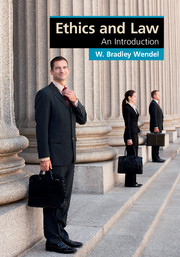Book contents
- Frontmatter
- Contents
- Preface
- Part I Lawyers, ethics, and the law
- 1 Defining the problem
- 2 Justifying principles of professional ethics
- 3 The adversary system
- 4 The nature of law and why it matters
- 5 Legal obligation and authority
- 6 Unjust laws and legal systems
- Part II The many roles of lawyers
- References
- Index
- References
4 - The nature of law and why it matters
Published online by Cambridge University Press: 05 October 2014
- Frontmatter
- Contents
- Preface
- Part I Lawyers, ethics, and the law
- 1 Defining the problem
- 2 Justifying principles of professional ethics
- 3 The adversary system
- 4 The nature of law and why it matters
- 5 Legal obligation and authority
- 6 Unjust laws and legal systems
- Part II The many roles of lawyers
- References
- Index
- References
Summary
Law, morality, and legal ethics
Lawyers have obligations, stated in officially promulgated codes of conduct and other authoritative sources of law, to do things such as keep their clients’ secrets and be effective advocates for their clients’ positions. It is therefore quite tempting to try to justify the conduct of lawyers by referring to the law, for example.: “The law requires lawyers not to disclose confidential information.” Think about it for a minute, though. The law may create obligations, but it may not follow that it creates moral obligations. Suppose someone says, of the lawyer representing the real killer, Wilson, in the wrongful conviction case from Chapter 1, “You did wrong morally by keeping Wilson’s secret.” it is not necessarily an adequate answer for the lawyer to say, “I had a legal obligation to do so.” There is potentially a gap between legal and moral obligation. Perhaps there is a way across that gap (another bridge!), but it has to be made clear whether, and under what circumstances, a legal obligation makes any difference in the domain of morality.
In an article that was somewhat scandalous when it was first published in the Harvard Business Review, Albert Carr, a former advisor to US President Harry Truman, heaped scorn on those who argued that businesspeople ought to be guided by the standards of ordinary morality (which Carr identified as the morality taught in religious traditions). Instead, Carr argued, business ought to be understood as a game, like poker, and the ethical norms of business ought to be only to follow the rules of the game. As long as some action is not illegal, it is ethical as long as it complies with the rules of the game, and the game of business, as it turns out, permits a variety of seeming wrongs, including industrial espionage, deceptive labeling of food products, firing older workers to reduce pension costs, indifference by auto manufacturers to the safety of their products, and the substitution of inexpensive, possibly dangerous ingredients in health care products.
- Type
- Chapter
- Information
- Ethics and LawAn Introduction, pp. 62 - 88Publisher: Cambridge University PressPrint publication year: 2014



